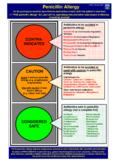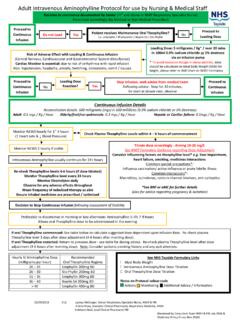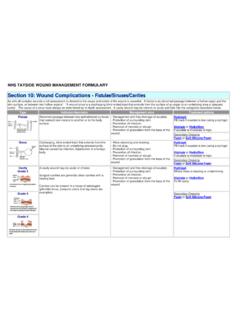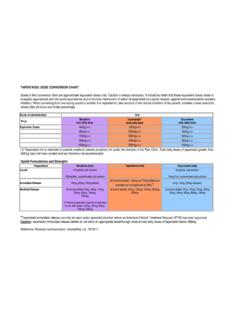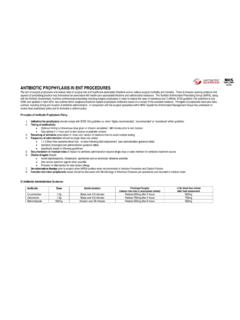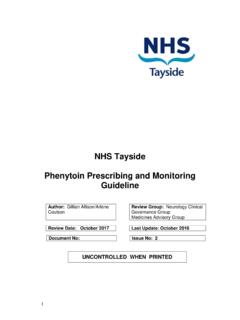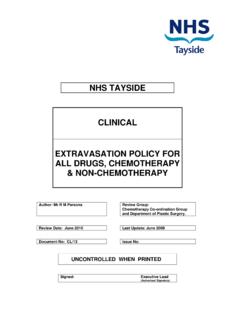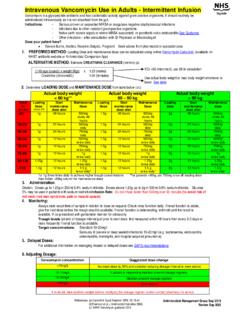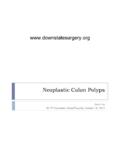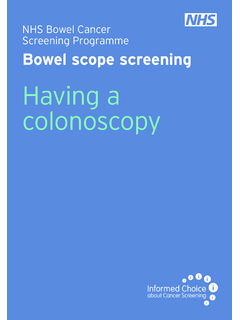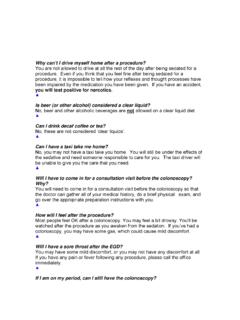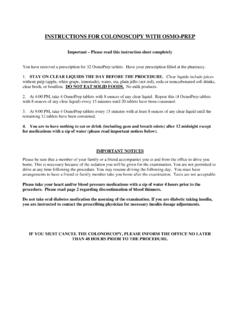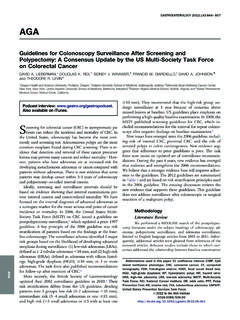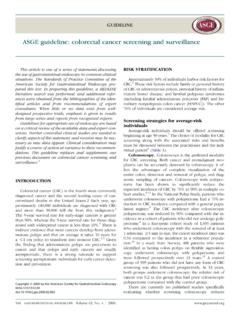Transcription of Department of ENT Nasal polyps management
1 Department of ENT Nasal polyps management Nasal polyps are a chronic inflammatory condition of the nose and paranasal sinuses. They are characterised by slow, progressive Nasal obstruction, with accompanied reduction in sense of smell. polyps will appear generally pale (yellow-grey colour), and insensate, while the turbinates are pink/reddish and will feel light to touch. At least a third of patients with Nasal polyps will also have asthma. polyps are usually bilateral; be wary of patients presenting with unilateral symptoms or a unilateral polyp, as this may herald the presence of an underlying neoplasm. Corticosteroids remain the mainstay of treatment for this condition; care should be taken when the patient is on other corticosteroids to avoid adrenal insufficiency. Young people with allergic rhinitis can occasionally be misdiagnosed as having polyps .
2 Nasal polyps are rare in the young. It is important to be confident of the diagnosis before implementing the treatment plan especially if this includes the use of systemic steroids. Numbers within above algorithms correspond to these notes: 1)Establish diagnosis Nasal polyps represent a subgroup of chronic rhinosinusitis. Diagnosis is based primarily on assessment of signs and symptoms followed byspecialised investigations if indicated. At initial presentation, all patients found to have polyps should be examined by an information on diagnosis can be found from BMJ Best Practice Nasal polyps , and related guidance, NICE CKS Sinusitis, whichare based upon BSACI guidelines for the management of rhinosinusitis and Nasal polyposis, 2008, and EPOS 2012: European positionpaper on rhinosinusitis and Nasal polyps 2012.
3 A summary for )Long-term Nasal steroid A long-term Nasal steroid spray mometasone furoate may improve symptoms as it will deliver the steroid well around the Nasal cavity. This can be given at higher doses, mometasone furoate 2 sprays in each nostril twice daily for the first 6 weeks, then reduced to maintenance dosing (2 sprays in each nostril once daily) depending on )Flixonase nasules (fluticasone propionate Nasal drops 400 micrograms/unit) Stop maintenance Nasal steroid spray if this is currently prescribed, and start Flixonase nasules 200 micrograms (approx 6 drops) into eachnostril twice daily (the contents of one 400 microgram container should be divided between both nostrils). This should be done on specialistrecommendation/advice. A 6 week course is normally recommended, however a 2 month trial may be undertaken is those with a moderatedeterioration of known/previous Nasal polyps on specialist )Oral steroids If a patient has had Nasal polyps previously diagnosed / treated by an Otolaryngologist, and there has been a significant deterioration insymptoms, please check previous correspondences as advice may have been given for this situation.
4 Oral steroids are not advised unless there are obvious polyps associated with severe symptoms. If there is a severe deterioration in symptoms, 20mg daily of oral prednisolone for 14 days (if the patient s medical condition allows) should be combined with 6 weeks of Flixonase nasules, twice daily. Treatment using oral steroids and Flixonase nasules can be repeated up to twice a year, however if it fails to control the symptoms, a referralto ENT is advised. Oral steroids (prednisolone 20mg daily for 14 days) may also be indicated in patients who have a moderate deterioration in symptoms wherea 2 month trial of Flixonase nasules has failed to control symptoms. If the diagnosis has not been confirmed by an Otolaryngologist, oral steroids are generally not )ENT rererral For confirmation of diagnosis or if red flags.
5 Nasal polyps causing significant Nasal obstruction. Poor response to Nasal steroid spray mometasone furoate after 3 month trial (after assessing compliance and technique). Poor response to course of Flixonase nasules or course of oral steroids with Flixonase nasules. Patients with persistent symptoms despite maximum medical treatment may be referred for consideration of Nasal polypectomy endoscopicsinus : 1. BMJ Publishing Group Limited 2017. BMJ Best Practice. Nasal polyps . Last updated Sept 12, 2016. Accessed from (30/03/2017)2. NICE Clinical Knowledge Summaries. Sinusitis. Last revised in October 2013. Accessed from (30/03/2017)3. Scadding, , Durham, , Mirakian, R. et al. (2008) BSACI guidelines for the management of rhinosinusitis and Nasal polyposis. Clinical and Experimental Allergy 38(2), 260-275.
6 Accessed from (30/03/2017)4. Fokkens, , Lund, , Mullol, J. et al. (2012) European Position Paper on Rhinosinusitis and Nasal polyps 2012. Rhinology 50(1), 1-12. Accessed (30/03/2017)Produced by Mr Peter Ross, Consultant Otolaryngologist, Ninewells Hospital, Dundee with Arlene Coulson, Lead Clinical Pharmacist Specialist Services & Surgery, and Claire James, Senior Pharmacist Clinical Effectiveness, NHS Tayside Prescribing Support Unit. March 2017; Review date: March 2020. Known/previous Nasal polyps Symptoms/clinical signs of Nasal polyps (1) Poor Nasal air entry Response good Suspected Nasal polyps Should be prescribed a topical Nasal steroid long-term (2) Moderate deterioration Significant deterioration in symptoms/severe deterioration Complete obstruction Nasal air entry good Long-term Nasal steroid spray (2) 6 week course Flixonase nasules twice daily on specialist recommendation only (3,5) ENT referral (5) Check previous correspondence for advice.
7 Otherwise 20mg oral prednisolone for 14 days with 6 week course Flixonase nasules twice daily on specialist recommendation only (3,4,5) Reduce to maintenance dosing of long-term Nasal steroid (2) 2 month trial Flixonase nasules twice daily on specialist advice only (3,4,5) Response good Response poor Response good Response poor Reduce to maintenance dosing of long-term Nasal steroid (2) Response poor
